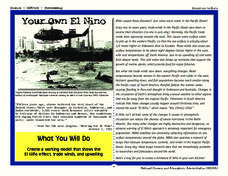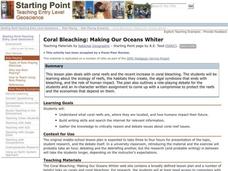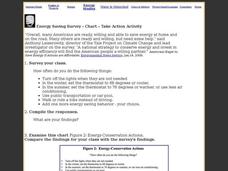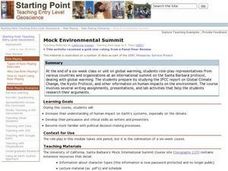Center for Learning in Action
Investigating Physical and Chemical Changes
Super scientists visit ten stations to predict, observe, and draw conclusions about the physical and chemical changes that occur when different states of matter—liquid, solid, and gas—are placed under a variety of conditions. To...
Center for Learning in Action
Water—Changing States (Part 1)
Here is part one of a two-part lesson in which scholars investigate the changing states of water—liquid, solid, and gas. With grand conversation and up to three demonstrations, learners make predictions about what they think will happen...
NOAA
Your Own El Nino
Scholars make a model to discover how the force of trade winds over the Pacific Ocean creates an El Niño. Super scientists observe how the severe weather affects life in water and on land.
NOAA
Make an Edible Coral Reef
Coral reefs are full of an abundance of life and color. Why not celebrate it with an edible coral reef? Learners and teachers alike use cake, icing, and candies to create a tasty version of a coral reef that's complete with colors,...
Foundation for Water & Energy Education
How Can Work Be Done with Water Power? Activity C
Third in a set of lessons regarding reservoirs, dams, and hydropower, this involves a two-day hydropower plant simulation. Collaborative groups build, maintain, and finance the plant. The transparency of the reservoir setup can be...
Curated OER
Roller Coasters
Twisting and turning through the sky, roller coasters are popular attractions at amusement parks around the world, but how exactly do they work? Explore the physics behind these thrilling rides with an engineering design activity....
Growing Minds
Apple Exploration
Turn your classroom into a farmers' market! Reading Applesauce Season by Eden Ross Lipson or Monica Wellington’s Apple Farmer Annie, launches this investigation of apples, farmers' markets, and the people selling products. The class...
Curated OER
Coal Flowers
Let's make coal flowers! With this fun activity, young learners watch and learn as they grow crystals! With simple household materials and the instructions included in this lesson plan, your class can grow their own crystals. Learners...
Curated OER
Chemical Composition of American Coins
High schoolers investigate the chemical composition of pennies dated 1983 or later. In this chemical composition of American coins lesson plan, students scratch the surface of the penny to expose the zinc core. They put the penny in...
Exploratorium
Corner Reflector
If you set up a triad of mirrors into a corner figuration, they act as a kaleidoscope, bouncing light waves back and forth indefinitely, changing the light that your eyes perceive. Although the materials required are very specific and...
Rainforest Alliance
Investments in Forest Carbon
One hundred metric tons of CO2 can accumulate in one acre of forest over time—that's a lot of carbon! In the activity, groups of middle school learners determine what makes forests important. They then solidify the concept by using a...
Safe Drinking Water Foundation
How Water Pollution Is Cleaned Up
As a follow-up from the previous instructional activity, young environmentalists discuss the benefits of water filtration and whether or not it's the best option. Other alternatives including air stripping, bioremediation, and...
Curated OER
Streetfilms' Moving Beyond the Automobile
This is an exceptional series that you can use in an environmental or engineering unit. There are four lessons: "Sustainable Transportation," "Designing for Safety," "Changing the Landscape," and "Engaging in Policy." Each lesson...
Curated OER
The Shocking Truth about Fruit
In this fruit worksheet, students read about fruit and then follow directions on how to make batteries out of fruit. Students also answer 10 questions while doing this.
Chymist
An Experiment in Alchemy: Copper to Silver to Gold
Use chemistry to change pennies into gold coins! The experimental procedure leads learners through the process of changing copper pennies to silver and then to gold. They record the mass of each coin through every step of the experiment.
Pulitzer Center
Extractive Industries
Here is a chance for environmental studies classes to take a critical look at crises occurring around the globe by reading articles and viewing video clips. The human activities under scrutiny are the extraction of oil, logging, and...
Space Race
Sensory Detectives
Test your learners' sensory awareness with three hands-on activities that ask pupils to use their other senses to identify and describe everyday objects hidden from sight.
Curated OER
Walking the Talk
Students research production, consumptions, and disposal of everyday items and their ecological impacts. In this sustainable economics lesson, students discuss clothing and various items used everyday in groups. Students then study a...
Curated OER
Sixth Grade Science Test
In this science activity, 6th graders take a multiple choice quiz about matter, properties, electricity, and more. Students complete 30 questions total.
Curated OER
Coral Bleaching: Making Our Oceans Whiter
Students study coral reefs and the controversy over coral bleaching. They role-play a debate over the issue and come up with a compromise to protect the reefs and the economies that depend on them.
Curated OER
Energy Saving Survey - Chart - Take Action Activity
In this saving energy worksheet, learners survey the class about saving energy, examine an energy chart, and answer short answer questions. Students complete 4 tasks.
Curated OER
A Look At Osteoporosis
Eleventh graders study osteoporosis and understand the relationship between calcium and bone mass. In this investigative lesson students participate in an activity in which they graph and construct basic bone biology.
Curated OER
Mock Environmental Summit
Students increase understanding of human impact on Earth's sytems and the climate. They develop persuasive and critical skills as writers and presenters. They become familiar with political decision making processes.
Curated OER
Basic Needs of Living Things - Lesson One
An interesting way of teaching about basic needs of different organisms awaits your fourth graders. Pupils take part in class discussions and demonstrations which should lead to a greater understanding of how to determine basic needs. As...























